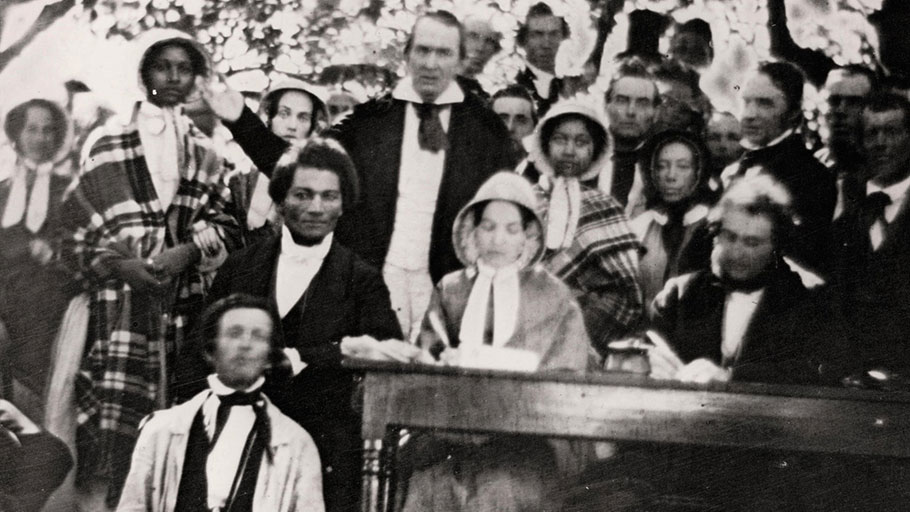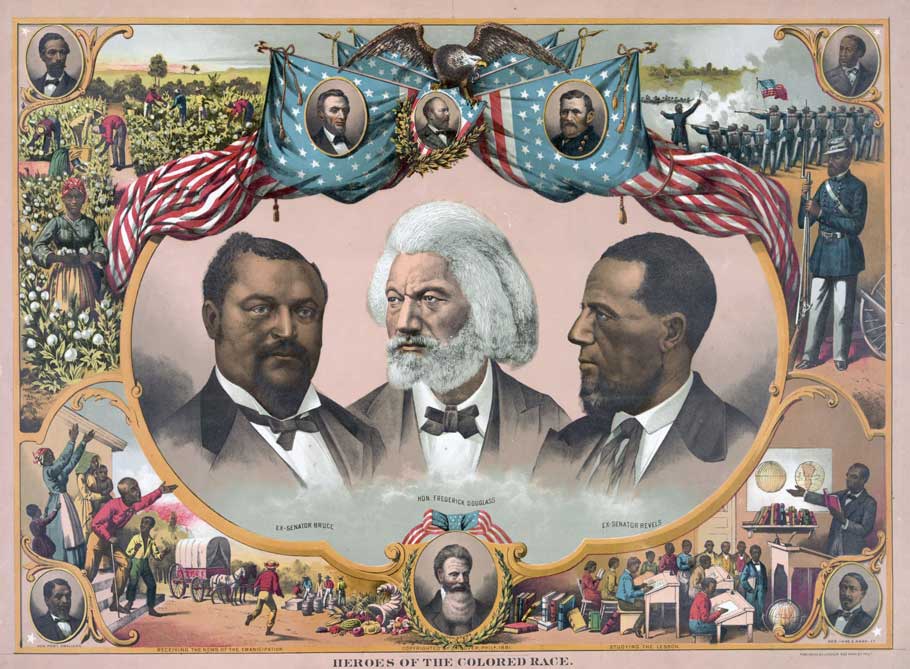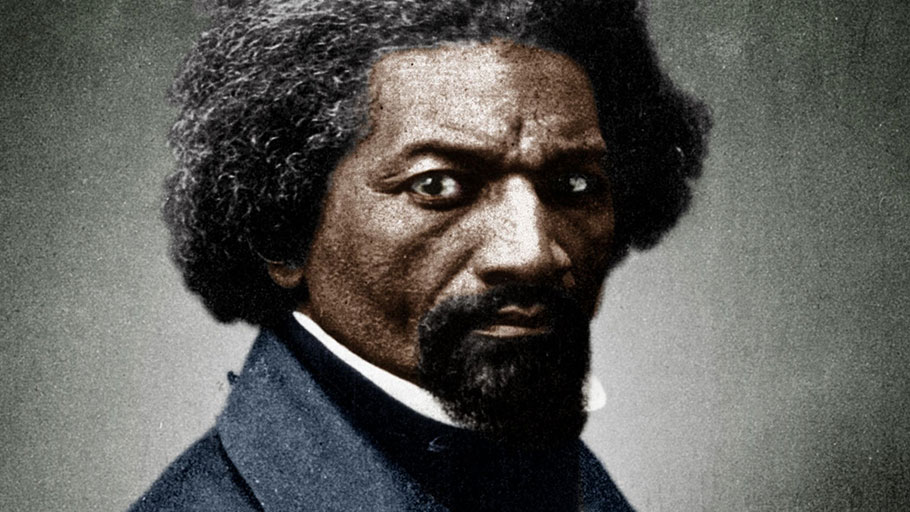‘At first I didn’t want to,’ says the author of this magisterial biography of the great abolitionist, ‘it was so daunting’
By Martin Pengelly, The Guardian —
David Blight arrives in New York pulling his carry-on luggage, en route from Washington, soon to fly onwards to San Francisco. Such is the interest in his new biography of Frederick Douglass, a book 10 years in the writing and a whole career in the making, he will be on the road till December.
He takes off his lovingly battered Michigan State cap, picks up a coffee and sits down for another conversation.
“I’m lucky there’s so much interest,” he says, “and I’m lucky to have a publisher that really cares to send me around. I’ve never done a book tour like this.”
Not many Yale professors have. But Blight’s perseverance is entirely befitting of his subject. Douglass’s struggle against slavery and for black equality threads through 19th-century America, from plantation to whaling port, from the pulpits of Boston to the battlefields of bloody Virginia. In stunning detail, with literary verve appropriate to his subject, Blight has written a scholarly biography that often reads like a novel by Melville.
Now he’s riding the rails, speaking from town to town. It’s easy to imagine his subject saying as he does: “There are times I wonder, ‘Did I already say that to this audience? No, I said that yesterday.’”
Blight laughs. He laughs again when I mention Donald Trump.
I have to, really. In February last year, marking Black History Month, Trump said: “Frederick Douglass is an example of somebody who’s done an amazing job and is getting recognized more and more, I notice.”
As with anything the billionaire tweets or blurts, ballyhoo and controversy followed. Blight has already given his take: to the Washington Post on “the dangers of presidential ignorance”; for the Guardian on Trump as “the gift that keeps on giving”. In conversation, he duly concedes that the work of any historian is now coloured by the trials of the Trumpian age.
“He’s the subtext of almost anything,” he says, “whether we like it or not. And I get asked this at talk after talk: ‘What would Douglass do about Trump?’ Or, ‘What about Douglass can we think of and use now?’”
I get asked this at talk after talk: ‘What would Douglass do about Trump?’
Such questions are valid. It may be a cliche to say history teaches us to avoid the mistakes of the past, not least because we never do. But it’s also true that readers always seek parallels with their own lives and times. The life of Douglass, Blight says, contains “a tremendous set of lessons for today, whatever issue we’re discussing in this wildly diverse and amazing country we have here but a country completely divided.
“‘Polarized’ is our new word. In the 19th century they called it “disunion”, in the civil war. Hopefully, we’re not going there.”
We’re not – at least not now, over espresso on West 36th. But our subject matter remains explosive.
Many Americans, Blight says, know the story of Douglass the slave, the fugitive, the campaigner for abolition. But most know less of his third act, the 30 years after slavery’s end in which white America lashed back and he saw much of his work torn down. Blight deals with this period at length on the page, fascinated by “this question of the radical outsider who becomes the political insider and what does that do to his own psyche, his own mentality, and his own sense of himself over time?”
He finds a modern parallel: “Think of John Lewis and many, many other leaders of the civil rights movement … They’ve lived the same trajectory for more than 50 years, from ’64 and ’65, the civil rights acts, the Voting Rights Act. We have, ever since Reaganism, frankly, lived through a sustained reaction.
“All revolutions have counter-revolutions, and that’s precisely what happened after the civil war. It’s precisely what is happening with the American conservative movement all the way back to [Barry] Goldwater but especially since Reaganism, then with [Newt] Gingrich’s Contract with America, and now with this phenomenon of Trumpism.”
The current president’s “conservative populism”, Blight says, “is a whole set of reactions to the great changes, to generalise, of the 1960s: the various liberation movements, women’s rights, gay rights, gay marriage, and then of course all of the great changes in race relations.
“Douglass lived that very trajectory in the 19th century, as did others. But he is the most visible prototype of that.”
‘Beautifully human’
Douglass was born in 1818, escaped from slavery in 1838, met Abraham Lincoln in 1863 and died in 1895. Writing his first full-length biography in nearly 30 years was never going to prove a simple task. Blight missed his first planned publication date, 2015, in part thanks to open-heart surgery.

A daguerreotype of the Fugitive Slave Law Convention at Cazenovia, New York, on 22 August 1850, Douglass seated at left. Photograph: The Art Archive/Rex/Shutterstock
Now the book is here and it is the result of 40 years’ study, from Blight’s student days at Michigan State and Wisconsin-Madison through a spell as a high school history teacher and appointments at Cambridge, Harvard, Yale and elsewhere. And yet, as Blight says, it still “came about by sheer blind luck”.
About 10 years ago, Blight “went to Savannah, Georgia, to give a talk to high school teachers on the Narrative” – the first of Douglass’s three autobiographies, published in 1845. It was something he had done many times. “But this time the host, the Georgia Historical Society, said, ‘There’s this local gentleman here who is a collector and he’d like to go to lunch afterward and meet you.’ And I said, ‘Eh, fine.’
“And I met the most extraordinary man that day: Walter Evans. He took me over to his house, a big, beautiful, four- or five-story brownstone in Savannah, and it was absolutely chock full of African American rare books, manuscripts and art.”
On return visits, the historian sat at the dining room table, drinking coffee, as treasures including Douglass family scrapbooks were brought out and spread before him.
Such rich material, Blight says, “made me realize that if I don’t attempt to do this biography, somebody else will. And in fact, at first, I didn’t want to. It’s so daunting to take on the full life of somebody so complicated, so important and well-known. But I just decided, why not?”
A decade on, the biography is dedicated to Evans and his wife, Linda. Reviews have been overwhelmingly positive, many noting Blight’s attention to Douglass’s development as a writer and speaker, his biblical language, his place as an American prophet. Some, though, have also highlighted the due diligence Blight performs on the more negative sides of the man.
I’m not letting him off the hook on his many human flaws
“There’s been a lot of work on Douglass going on,” Blight says, citing books by John Stauffer and others, “but not a full life like this. So that’s what I was attempting to do. And of course, you know, when you’re doing the full biography, cradle to grave, public and private sides of the life, there are things you’re gonna treat extensively and things you’re not gonna treat extensively. That was always the trick, how to balance.
“I’m not letting him off the hook on his many human flaws. I call him ‘beautifully human’, whether that’s in his private affairs, his domestic situation with two marriages, his relationships with his children, which are fascinating. And revealing, because there a lot of letters between Douglass and his sons and his daughter.
“There are times when he’s obstinate and arrogant and also hypersensitive, with good reason, to slights, whether they were racial or slights about his lack of any formal education.
“He’s also, for vast parts of his life, an absent father. This is a man who could only make a living by travelling, by being a lecturer. So he’s gone most of the time his kids were growing up. They never, as far as I know, publicly complained about it, but you can sense it in some of the letters.”

A chromolithograph, containing portraits of Douglass, Blanche Kelso Bruce and Hirah Rhoades Revels. Photograph: Photo 12/UIG via Getty Images
Blight senses a lot in Douglass’s letters, extrapolating, for example, a picture of a difficult relationship with his first wife, Anna Murray-Douglass. She helped Frederick escape from slavery, kept his house and raised his children. She also remained illiterate and increasingly slighted. Blight also discusses Douglass’s relationships with other women, controversial in their own time. And he considers Douglass’s attitudes towards Native Americans, Catholics, the Irish.
“When he needed the argument, especially after the civil war, that black people were honest, thrifty, hardworking American citizens, he would say, ‘We have joined you in America. We are one of you. As opposed to the American Indians who just want to huddle in their blanket and go off to their hills.’
“I’ve had students who when they read that, they say, ‘Oh, my God.’ They say, ‘Frederick Douglass thought that of them?’ Well, I’m sorry, he did.”
In other words, Douglass was a man of his time, which was every bit as unforgiving as ours. Blight points out that though Douglass was an ardent supporter of women’s suffrage, the sole male speaker at the Seneca Falls convention of 1848, the question of the black vote prompted a split and “some brutal racism” towards Douglass from Elizabeth Cady Stanton and Susan Anthony, pioneers of women’s rights.
And with that we are back where we started, discussing lessons that might be learned by Blight’s readers, particularly students, particularly those ranged against Trump and Trumpism on the political left.
‘The pragmatism of politics’
We discuss Douglass’s intellectual and political development, first under the influence of the great abolitionist William Garrison, through an extensive relationship with John Brown, the great insurrectionary dreamer, and on through civil war, Reconstruction and the violence of Jim Crow.
In the years before the war, Blight says, what Douglass “really most fondly wanted was for something to happen, either politically, legally, or violently, that would cause some kind of breakup of the union, and some kind of sanctioned attack on the institution of slavery by federal action”.
He came to welcome and admire the fact the Republican party was devoted to stopping the expansion of slavery
That breakthrough came with the founding of the modern Republican party.
“He begins to learn hard the pragmatism of politics,” Blight says. “That you’re going to have to make deals. That you’re going to have to make relationships that aren’t comfortable. And that is what he ends up doing with that thing called the Republican party, which was born in 1854 and ran its first presidential candidate in ’56.”
Perhaps with a mild rejoinder to Republicans under Trump who claim Douglass – like Lincoln – for their own, he adds: “Douglass was never comfortable with the Republicans. They weren’t radical enough for him in those first six years before the civil war. But he came to not only accept, but even welcome and admire the fact that the Republican party was devoted to stopping the expansion of slavery. They were not morally abolitionists as much as he wished, but nevertheless, they were threatening the south. The enemy of my enemy can be my friend.”
Conversation done, coffee drained, Blight heads back to his book tour. Throughout all subsequent drafting and redrafting of this interview, two of Douglass’s most famous remarks demand inclusion, surviving every recasting and cut.
In 1857, in Canandaigua, New York, Douglass delivered a speech marking the anniversary of emancipation in the British West Indies. “Power concedes nothing without demand,” he said. “It never did and it never will.”
But in 1855, in Rochester, he said: “I would unite with anybody to do right, and with nobody to do wrong.”
- Frederick Douglass: Prophet of Freedom is published in the US by Simon & Schuster. It will be published in the UK on 1 November















